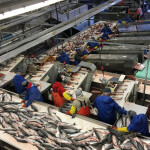The aquaculture industry in Maine is steadily growing, with three large farms being built with recirculating aquaculture systems by Nordic Aquafarms, Whole Oceans, and The Kingfish Co., but will the state be able to grow its workforce to meet the demand for skilled employees?
That’s the question asked and addressed in a new 123-page report from the Gulf of Maine Research Institute that identifies the labor needs of Maine’s growing aquaculture industry and charts a course for Maine to establish a comprehensive workforce training system.
“Maine is uniquely positioned for sustained aquaculture growth owing to an abundance of cold clean waters, proximity to large markets and distribution centers, the ‘Maine’ brand, strong industry representation, world class research centers, first-rate education and training institutions, and support from nonprofits focused on community economic development,” according to a report summary. “However, the lack of a trained workforce could jeopardize Maine’s aquaculture future.”
According to GMRI, Maine’s current aquaculture workforce exceeds 600 direct employees, plus auxiliary services, further trades, transport, processing, equipment supply, and retail employment across the value chain. The report predicts that the state will need around 880 employees across production and related activities, and over 1,600 across the supply chain, by 2022 and then over 1,000 direct employees, and over 2,000 in the total production, supply chain and downstream markets by 2030.
“Finding workers with the right skills is a year-after-year challenge for Mook Sea Farm,” said Bill Mook, owner of Mook Sea Farm. “I’m impressed with the proposed system that is founded on industry needs and prioritizes the type of training and experience to produce employees that can enable our continued growth.”
Through interviews with individuals involved in Maine’s aquaculture sector, GMRI noted a good work ethic, problem solving, trade skills like plumbing, electrical and mechanics, and maritime operation experience as common core values in the workforce right now. Aquaculture leaders suggested that training programs that provided opportunities for workers with those core skills to learn additional technical and scientific skills in-house would be a boon for the workforce.
The report goes on to identify opportunities to meet those predicted workforce needs, including the need for programs structured to develop and formalize occupational competencies, opportunities for training through Maine’s community colleges and career technical education centers, and the creation of three vocational hubs across the state to provide vocational training specific to aquaculture: Southern Maine Community College in South Portland, the Mid-Coast School of Technology in Rockland, and Washington County Community College in Calais.
The report also recommends the development of a Maine Department of Labor-approved aquaculture apprenticeship program, the development of new occupational standards, and marketing support to promote the new learning opportunities.
With these educational programs in place, Maine could become a serious player in aquaculture training as an international hub.
“There is potential for Maine’s higher education sector to attract international students. The United States has a strong reputation for higher education and as an English-speaking country will be attractive to a wide variety of students,” the report said. “Given the projections for global aquaculture growth, there should be a clear case for U.S. institutions to develop similar capacity, and Maine may be sufficiently diverse in its production, with active aquaculture educators, to be a good candidate.”
Photo courtesy of Whole Oceans







